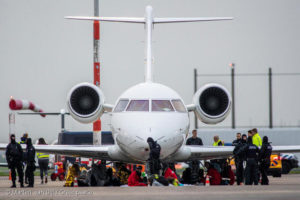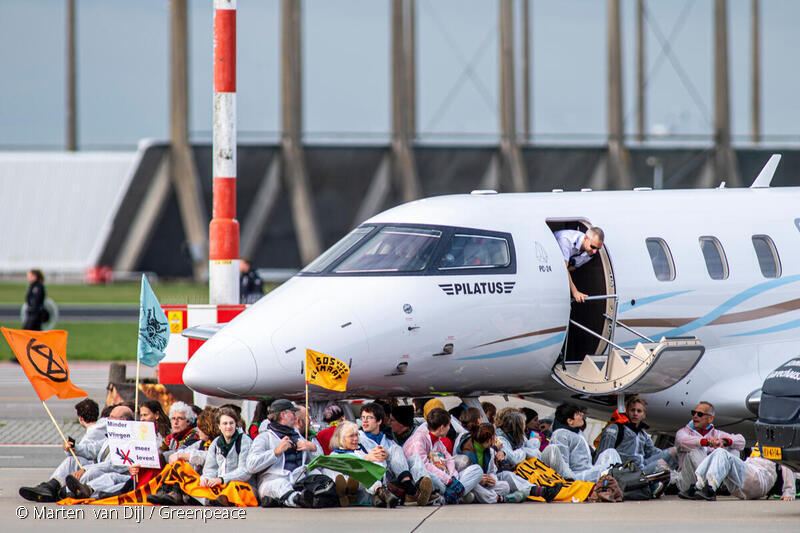Words by Ben Sampson
In the last ten years the existential threat posed by climate change has mixed with social media to create a new type of radical environmental activism. This direct action, sometimes described by more hyperbolic media as eco-terrorism, is taken by citizens with the aim of disrupting everyday life to draw attention to climate change.
Principally happening in Europe and most often perpetrated by young people, the disruption and vandalism has shocked many. Priceless works of art have been damaged in galleries supported by oil companies. Major roads have been blocked during rush hour traffic in order to draw attention to vehicle emissions and pollution.
Business aviation has not escaped the aim of activists in Europe. “Airports are not immune, activism is stopping flights from taking off,” said Rana Walker, Wastyn GR&T Management, a specialist in misinformation and social media speaking at the recent British Business and General Aviation Association (BBGA) conference in London.
At Schiphol Airport in Amsterdam, the Netherlands during November 2022 protesters blocked private and business aircraft from taking off and landing for eight hours. Organized by Greenpeace and Extinction Rebellion, around 500 people targeted operations at the General Aviation Terminal at Schiphol Oost.
“The airport should be reducing its flight movements, but instead it’s building a new terminal. The wealthy elite are using more private jets than ever, which is the most polluting way to fly,” says Dewi Zloch of Greenpeace Netherlands.
“This is typical of the aviation industry, which doesn’t seem to see that it is putting people at risk by aggravating the climate crisis. This has to stop. We want fewer flights, more trains and a ban on unnecessary short haul flights and private jets.”
The action at Schiphol was followed by similar protests at business airports and FBOs in the UK, Italy, and Germany. The protests were timed to coincide with the start of the COP27 climate change conference in Egypt that month. All the groups involved are demanding a total ban on private jets, and high taxes on airline frequent flyers. “The movement has caught momentum and they are planning action throughout Europe,” says Walker.

Amongst the main themes of the BBGA conference this year were reducing business aviation’s impact on the environment and encouraging young people into the sector. Ironically, young environmental activists tried to disrupt the conference, as they had similar recent events in London. Dressed all in black, shouting rhetoric about environmental damage and the slow pace of change walking around the audience, when asked to participate in the conference they refused.
The interruptions caused mostly anger amongst the BBGA conference delegates. Understandably, many in aviation feel that their livelihoods are under attack by environmental activists. While aviation is responsible for 2.4% of CO² emissions according to the International Council on Clean Transportation, the sector is taking steps to reduce, mitigate and eventually eliminate its impact on the environment. Meanwhile many other industries are inflicting worse damage on the environment and escaping attention. For example, the EU estimates that the fashion industry is responsible for 10% of global carbon emissions – more than aviation and maritime shipping combined.
Information and social media
Walker believes that the spread of misinformation on social media platforms is part of the reason business aviation has become a target for environmental activism. “Misinformation is a problem around the world and in business aviation it is pervasive. Keyword terms like flying and lying, flying shame, greenwashing, banning and taxing private fliers have become common online,” she says.
Another contributing factor is that new ways of tracking aircraft has led to widespread disclosure of and reporting about how wealthy individuals use their private jets. Stories about celebrities taking short journeys by private jet when they could have used less polluting forms of transport do not paint the whole picture though.
“The reality is that businesspeople use private aviation the most. People need to stand up and be counted for doing this, like Bill Gates has,” says Walker.
“He has come out and said he is part of the solution, offsetting his flights and donating billions into sustainable causes. We need to recognize these people.”
The impact environmental groups have must also be measured and kept in proportion. Some activist groups such as End UK Private Jets, which last year defaced a statue of British aviator and charity fundraiser Sir Captain Tom Moore, have a small number of followers and no funding. “With actions like these when they get on to the news media, because they are young and their messaging has not been thought through, they are dismissed,” says Walker.
Other groups do gain more traction, especially on social media platforms. In these cases, Walker offers ways aviation companies can help fight misinformation online. As well as a platform for negativity, social media offers an opportunity to engage with environmental activists.
“They want to be heard, so you need to listen and respond,” Walker says. “It is a collective effort from within the industry, like safety has been. Sustainability is a global issue and it’s an aviation industry issue,” she says.

Companies should aim to be transparent on environmental issues by communicating the progress being made towards net zero via social media and through collaborations with education, academia, other sectors of the travel industry, policy makers and watch groups. “The sector needs to tout its benefits and the sustainable options, like SAF,” Walker says.
Benefits of business aviation, such as its value to the economy and the role it plays during humanitarian crises, such as during the Covid-19 pandemic should be emphasized. But above all the industry needs to participate in discussions about environmentalism. “How can you be part of the solution if you are not even part of the conversation?” Walker asks.
“It’s easy to complain but harder to contribute, I am being provocative, but the industry needs to step up and become involved. Communications should lead with problem solving and highlight other areas of excellence, such as on diversity, equity and inclusion.
“Get involved locally and share good news. Don’t sit back and be a victim, don’t deflect but inform and engage.”
The next generation
Greenpeace regularly refers to a study conducted by UK-based thinktank, Transport & Environment in its communications. The study finds that private jets are 5 to 14 times more polluting than commercial planes per passenger km, and 50 times more polluting than trains.
James Hardie, director of Course Correction Consulting believes that how aviation is measured regarding climate change is one of the sector’s biggest challenges. Speaking at the BBGA conference he said, “Per seat km can be a misleading value point that does not recognize other sources of wealth creation
that arise.
“Aviation is an industry that has always encouraged innovation and met difficult challenges in a competitive environment. It has always been considered the most efficient way of linking cities and it is a driver for economic growth,” he says.
According to a 2021 study published by Aviation Benefits and Borders, a pro-industry group setup by the Air Transport Action Group, aviation supported 87.7 million jobs and US$3.5 trillion, or 4.1% of the world’s GDP in 2019. It also supports several UN Sustainable Development Goals and the UN’s broader 2030 Agenda for sustainable development.
However, to safeguard aviation’s future Hardie believes there is also a need to actively bring young talent into the industry. For example, a recent Boeing study forecasts that up until 2039, around 739,000 technicians are needed worldwide with 192,000 needed in North America alone. With competition from other industries for these workers, the industry must consider the needs and aspirations of tomorrow’s workforce – millennials and GenZ.
A key aspect of this will be dealing with climate change believes Hardie.
“We need to make our industry an exemplary one where people want to work,” Hardie says. “We need to acknowledge some of the big challenges to attract these people, including sustainability and climate change.
“Aviation is demonized as the most significant contributor to climate change. Yet it isn’t. The sector
is poorly perceived, despite its technological and economic successes.
“We need to be aware that peer perception about jobs is especially important to young people. It is becoming more influential than parental perception.”
Education and context
On a more fundamental level, some in the industry argue that knowledge and understanding of what business aviation is and does needs to increase. Only then can it effectively communicate how it is tackling climate change to younger generations.
George Galanopoulos, managing director of Luxaviation UK has worked in business aviation for thirty years. “As an industry we have to accept that we haven’t done enough. The perception of business aviation in the UK is the same as it was thirty years ago,” he says.
“The NBAA has done well in the USA but the sector in that country is different. Statistics and evidence to support our case is vital. We also need to keep up with the times and engage on social media.”
Alex Durand, CEO of UK charter operator SaxonAir suggests statistics should emphasis the investment opportunities and economic value that business aviation brings to regions. “Business aviation is an enabler – we need to keep saying that because it is true. We don’t have to talk about sustainability as a special subject, you explain why we should exist and then we meet our obligations like any other sector,” he says.
However, Durand warns there is a danger of the sector over-justifying itself and that the narrative needs to be that aviation’s problems are common to other industries and areas of society. He says work such as giving talks at local schools about business aviation builds support in local communities. “We present ourselves as an opportunity. We are doing some great work in the schools. People are fascinated by what we do.”
Gus Paterson, chief operating officer at Pula Aviation Services and Centreline’s accountable manager agrees, and believes that local economic value is a good starting point for conversations about business aviation. For example, a lot of private aviation activity happens at large events, such as Glastonbury. Paterson says, “I live near where it is held and our business benefits from it. Locally it would be a disaster if it didn’t happen this year.
“People need to understand that world-class events, like Glastonbury or Formula One, require infrastructure to support people whose time is precious. It’s not an aviation message, it’s an economic message. An aviation message often won’t resonate, but a powerful economic one will.”
To many people business aviation has long had a glamorous image. Perhaps this is being tarnished by misinformation and the tracking of private jet usage. Direct action by activists has made the sector take notice of these issues. Furthermore, the risks to the sector could be existential. The challenge around the aviation’s action on climate change and the way it is perceived is a complex one, but must not be ignored.





